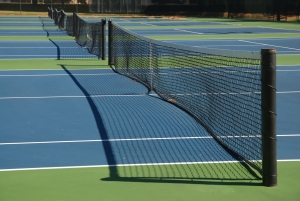Example 5-9 Section

A zealous father is trying to advance his son Jake's promising tennis career. Jake's father tells Jake that he'll give him \$500 if he wins (at least) two tennis sets in a row in a three-set series to be played with his father and the club champion alternately. The champion is a better player than Jake's father. Jake can choose who he plays first. If he plays his father first, he plays his father twice... first father, then champion, then father. If he plays the champion first, he plays his father once... first champion, then father, then champion. Which three-set series should Jake choose so as to maximize his chances of winning the \$500?
Solution
Because the champion plays better than the father, it seems reasonable that fewer sets should be played with the champion. On the other hand, the middle set is the key one, because Jake cannot get two wins in a row without winning the middle set. Now, let's define the following:
- Let \(C\)stand for champion.
- Let \(F\) stand for father.
- Let \(W\) denote the event that Jake wins a set. Let \(f\) denote the probability that Jake wins any set from his father. Let \(c\) denote the probability that Jake wins any set from the champion.
- Let \(L\) denote the event that Jake loses a set.
Let's first consider the case where Jake plays in \(F-C-F\) order (his father first, then the champion, then his father):
Now, let's consider the case where Jake plays in \(C-F-C\) order (the champion first, then his father, then the champion):
In summary, the probability that Jake wins at least two sets in a row if he plays in \(F-C-F\) order, is \(fc(2-f)\), and the probability that Jake wins at least two sets in a row if he plays in \(C-F-C\) order is \(fc(2-c)\). For example, if \(f=0.8\) and \(c=0.4\), then the probability that Jake wins if he plays in \(F-C-F\) order is 0.384, while the probability that Jake wins if he plays in \(C-F-C\) order is 0.512. Now, because Jake is more likely to beat his father than to beat the champion, \(f\) is larger than \(c\), and \(2-f\) is smaller than \(2-c\). Therefore, in general, \(fc(2-c)\) is larger than \(fc(2-f)\). That is, Jake is more likely to win the \$500 if he plays the champion first, his father second, and the champion again. As such, it appears that the importance of winning the middle game outweighs the disadvantage of playing the champion twice!